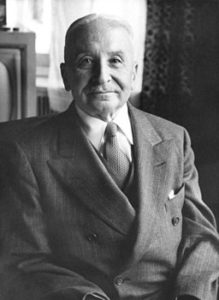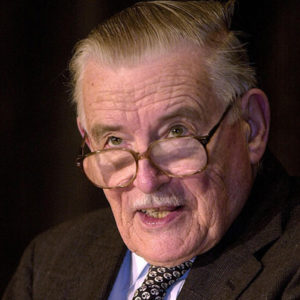Mises and Buchanan on Classical Liberalism versus Socialism
By Alejandra Salinas


The works of Ludwig von Mises and James M. Buchanan reflect the best of the classical liberal intellectual tradition. Given the centenary of the publication of Mises’ Socialism,1 and since 2023 marked the tenth anniversary of the passing of Buchanan, it seems an excellent time to remember their contributions. Both defend methodological and ethical individualism, private property rights, the design of a minimal state, a market economy and a liberal democracy. They agree that political and economic systems and decisions must be evaluated based on respect for the value of individual liberty and the institutions that protect it.
Other authors have assessed the main aspects of Mises’ and Buchanan’s economic analyses. Our purpose here is to compare some of their political views, namely, those that deal with the notions of consent and force, the relationship between liberalism and democracy, and the criticism of autocratic socialism.
Consent and force
Social philosophy explores the nature of social arrangements- the ideas, values, and behaviors that bring people together or separate them. For Mises, the classical liberal society is based on the principle of individual consent, the institution of contract, and the dynamics of social cooperation that follow from them. In that model, the state has only the task of protecting the life and property of individuals against violence, fraud or aggression (200, 497). Under the liberal protection of private property, people can achieve the “leisure and the peace of mind that only the division of labour can make possible” (271).
In contrast, he argues, the socialist attack on private ownership in the means of production promotes the use of force, leading to the destruction of economic resources (40, 61,222) and, more broadly, of civilizational achievements (118). Mises wrote in times of the expansion of communism, but his analysis is timeless given the ever-present conflict between consent and force: “Violence and Law, War and Peace, are the two poles of social life” (34). From this angle, evolution means to move away from violence, fighting and force, and closer to consent, law, and peace.

Buchanan shares a similar philosophy. In The Limits of Liberty.2 he defends the principles of individual consent and voluntary exchange as the basis of a free social order. In such an order, due to the possibility of violence and predation, individuals need to defend themselves by defining and enforcing their rights (31, 37). Thus, they adopt moral and legal precepts to accomplish a “peaceful and orderly settlement of disputes” (113-14). The opposite of this is socialism, defined as the “state control over voluntary exchange processes” (24). Also opposite to a limited constitutional order is a regime that extends the sphere of government well beyond its protective role (204-05).
To convey the contrast between classical liberalism and illiberalism, both authors make use of metaphors, which facilitate the communication of difficult or abstract notions and contribute with persuasive efforts when disseminating ideas. Successful metaphors include, for example, Adam Smith’s invisible hand, and its application to the “marketplace of life” and the “marketplace of ideas.”3
Mises uses a metaphor to address the destructive nature of socialism: he writes that it turns history into a “cemetery” of civilizations (275) since it eliminates the division of labor that allows for mutual cooperation and general progress. His association of socialism with death is not gratuitous, since the language of death and violence was always an important part of collectivist rhetoric. Thus, Marx and Engels hoped to “sway” the bourgeoisie, and they wrongly thought that it produces “its own grave-diggers,” while Antonio Gramsci saw modern political and civil associations as “the ‘trenches’ and the permanent fortifications of the front in the war of position,”4 and neo-Gramscians like Ernesto Laclau accept “reintroducing the dimension of violence into [social] reform.”5
Consequently, it is only natural that Mises warns about destruction as the ultimate result of collectivist violence and force imposed on human reality. On this point he lucidly alerts: “To make Collectivism a fact one must first kill all social life, then build up the collectivist state (…) All attempts to coerce the living will of human beings into the service of something they do not want must fail. An organization cannot flourish unless it is founded on the will of those organized and serves their purposes” (263).
For his part, Buchanan uses metaphors to describe two types of scenarios different and opposite from the classical liberal model of individual consent and voluntary exchanges. He speaks of the “jungle” to convey the image of a society without order and justice, and argues that to leave such a chaotic situation behind, individuals decide to abide by agreed-upon rules, and to the extent that they succeed in doing so, they build up social capital defined as a law-abiding society. Similarly, the undermining or the elimination of those rules represents “a major step backward into the anarchistic jungle” (66), that is, “the destruction of social capital, with all of the consequences therefrom” (164).
Buchanan uses another metaphor, the image of the legendary Leviathan, to criticize the State’s unduly coercion and force in the form of interference with individual property and markets, as revealed in the growth of the State in modern democracies and the associated increase in taxation, fiscal expenses, and public deficits. In a 1990 lecture, after the demise of the communist regimes in the Soviet orbit, he draws a pertinent distinction between Leviathan and the socialist system without private property: “The arguments for Leviathan’s extensions are not versions of the socialist’s dream; they are, instead, simple efforts to claim a public interest in a single sector’s private profit” (18). Buchanan sees the current unlimited State as a “monster” that haunts democracies by restricting individual liberty and property, and he seeks to predict its courses of action, its unintended negative consequences and propose ways to avoid them by means of strict constitutional and post-constitutional limits.
Liberalism and Democracy
Political philosophy studies the foundations and justification of political institutions and practices. For Adam Smith, the disquisitions about “the systems of civil government (…) if they are just, and reasonable, and practicable, are of all the works of speculation the most useful” (186-87). As mentioned before, Mises and Buchanan successfully engage in such “speculation” to offer a political philosophy defined in terms of substantive ends: the defense of individual liberty and private property, equality before the law, voluntary social cooperation, the achievement of peace, and the benefits of general prosperity. And they find in a limited government the institution that best protect the principles of a free society.
In this regard, Mises writes that the role of “the strictly Liberal state is to secure life and property against attacks from both external and internal foes” (133), and that “the rule of law, or limited government, as safeguarded by constitutions and bills of rights, is the characteristic mark of [Western] civilization” (521). In turn, he sees democracy as a “constitution” that avoids political violence, which is why he thinks liberalism “desires” democracy. He adds that democracy also needs liberalism to limit the power of the State in order to impair the negative consequences that follow from it (61-62, 65). In this way, liberalism and democracy have the joint task of protecting the individual by securing liberty and peace, respectively.
Buchanan advances similar ideas about the role of the State, the rule of law and a liberal democracy. He refers to a “law-abiding society of free men” (21) who adopt norms “that we associate with the precepts of individualism” (71). In the democratic system, individuals have the rights “to make their own collective choices” (20). In other words, democracy is a mechanism to express the political values or preferences held by individuals. The opposite of a liberal democracy is socialism, as he writes in a 1993 presentation: “The socialist constitutional order, whether this be defined in application to a single party, a self-appointed authoritarian regime, or asocial democratic parliamentary majority, necessarily extends the range and scope for politicization well beyond the narrowly defined limits of collective authority under the classical liberal order.”6 The challenge that arises is, therefore, to design a constitution that prevents or minimizes political excesses and deviations.
In sum, both agree that a limited, constitutional democracy is the political recognition of the value of individual consent underlying collective choices and of the aspiration to a nonviolent social order. They find that the main threat to this order is the power of governmental officers, who may “become absolute despots” (Mises 519), which is why according to Buchanan we should take the “romance” out of our political vision and always distrust that politicians seek a transcendent “common good.”7
The criticism of socialism
So far, we have addressed elements of political philosophy in the thought of Mises and Buchanan. The authors also write on the relationship between socialism and religion. However, their approaches in this matter differ: while Mises associates socialism with a type of religious sentiment and discourse, Buchanan offers an account of how the weakening of religious faith has been replaced by a secular faith in the extended State.
Let’s briefly present their views. Mises draws close connections between religion and Marxist theorists, who speak to the aspirations “embedded in the human soul” and to a future “full of happiness and enjoyment,” and who assume “a paradisiac origin” followed by an “age of evil” to be overcome by “earthly salvation” (249, 251). The concrete political form of this ideology would be similar to theocracies: if, in the latter, the authority is “endowed with a divine grace [and] superhuman powers,” the Bolsheviks pose “as the consummators of the great scheme of things” and accuse unbelievers of being heretics (163-64, 513).
In taking the communist system as a sort of political religion, Mises follows F. Gerlich (253) and joins other authors of that time. His critique of theocracy and more broadly, of socialism as an autocratic organization, is based on the fact that it sacrifices the individual for the sake of an allegedly higher cause. From this angle, Mises’ outlook follows a top-down direction, in which the Bolshevik “priests” preach a sacred text to the mass of the people, promise them a paradise, demand unconditional loyalty and grant favors or penances to their followers and detractors, respectively. From a theoretical point of view, the problem with this—Mises argues—is that it is a renunciation of scientific thought and the criticisms that “shatter false beliefs” (9).
In a 2005 paper, Buchanan also connects socialism and religion, but unlike Mises, he focuses mostly on the attitudes of the people and not on the discourses or actions of the political class. His term “parentalism” refers to persons “who seek to have values imposed upon them by other persons, by the state or by transcendental forces” (23, emphasis in the original).8 In his diagnosis of present day societies, Buchanan argues that the state has replaced God in people’s search for order and predictability. In modern times, individuals cope with the threat of the unexpected not by praying or going to church but by demanding “the parental role of the welfare State” (29). In other words, if religion once served the purpose of providing a sense of security in the face of fear and uncertainty of the masses, in secular times that provision of security is expected to be covered by the state. The upshot is that individuals depart from the personal responsibilities and endeavors that support a free society.
It is not the place here to discuss whether Marxism can be understood as a political religion, as Mises believes, or to assess if as Buchanan holds, the psychology of fear and irresponsibility can explain the growth of Leviathan better than the premise of rational wealth maximization. This more modest effort is to show that Mises and Buchanan include considerations about religious beliefs and psychological dispositions underlying the configuration of political institutions and that they alert against any ideology that feeds blind allegiance, submission, helplessness, or fear. A society of free and responsible individuals cannot prosper on such feeble grounds.
Conclusion
The works of Mises and Buchanan analyze the philosophical presuppositions, institutional designs, and policy prescriptions related to classical liberalism and socialism. Our text highlighted their treatment of the notions of consent and force and the relationship between liberalism and democracy. It also addressed their criticism of socialism understood as a theory and attitude that presents either an eschatological or a “parentalistic” politics.
The classical liberal paradigm that both authors defend means to facilitate voluntary exchanges among persons and to limit the exercise of force in social interactions. They both consider the costs and benefits expected to result from the social organization and conclude that only unrestricted markets and limited democracies are the institutions compatible with the values of a free society.
For more on these topics, see
- “Ludwig von Mises’s Socialism: A Still Timely Case Against Marx,” by Steven Horwitz. Library of Economics and Liberty, Oct. 1, 2018
- “Ludwig von Mises’ Socialism: A Proper Defense of Liberalism,” by Rosolino Candela. Library of Economics and Liberty, Aug. 1, 2022.
- “Lessons and Challenges in ‘The Limits of Liberty,’,” by Pierre Lemieux. Library of Economics and Liberty, Nov. 5, 2018.
- “Adam Smith’s Invisible Hand,” by Peter Foster. AdamSmithWorks, [undated].
Last, they both criticize socialism because it feeds unrealistic illusions by promising what it can never deliver, despite all the coercion and force employed to achieve it: a world of social homogeneity and of complete satisfaction of material needs. Far from it, the socialists and the welfarists end up creating a political system where the State—”the coldest of all cold monsters” (Mises, quoting Nietzche, 53), the fearful Leviathan (Buchanan)—devours resources and liberties with insatiable voracity and consequently turns into the major obstacle to human flourishing.
Footnotes
[1] Ludwig von Mises, Socialism: An Economic and Sociological Analysis, translated by J. Kahane, foreword by F. A. Hayek, Indianapolis: Liberty Fund, 1981 [1922/1951]. Also available online at
[2] James M. Buchanan, The Limits of Liberty: Between Anarchy and Leviathan, foreword by Hartmut Kliemt, Indianapolis: Liberty Fund, 2000. Also available online at https://www.econlib.org/library/Buchanan/buchCv7.html
[3] James R. Otteson, Adam Smith’s Marketplace of Life, Cambridge University Press, 2002; Alvin Goldman, Knowledge in a Social World, Oxford Clarendon Press, 1999, 164 (digital version).
[4] Antonio Gramsci, Selections from the prison notebooks, ed./transl. Q. Hoare and G. Nowell Smith, London, Lawrence & Wishart, 1971, 243.
[5] Ernesto Laclau, “Community and its paradoxes,” in David Howarth (ed.), Ernesto Laclau: Post-Marxism, populism and critique, Oxford, Routledge, 2015, 249.
[6] James M. Buchanan, “Notes on a Liberal Constitution” [1994], in Cato Journal. Vol. 14(1).
[7] James M. Buchanan, “Politics without Romance: A Sketch of Positive Public Choice Theory and Its Normative Implications” [1979], in The Collected Works of James M. Buchanan, Vol.1, Indianapolis: Liberty Fund, 1999, 145-59 at 47.
[8] James M. Buchanan, “Afraid to be Free: Dependency as Desideratum” [2005], in Public Choice, Vol. 124(1/2).
*Alejandra Salinas is a Professor at UNTREF and UCA in Buenos Aires, whose focus is on contemporary political philosophy, comparative political theory, social theory, democratic institutions and literature and politics.
For more articles by Alejandra Salinas, see the Archive.
